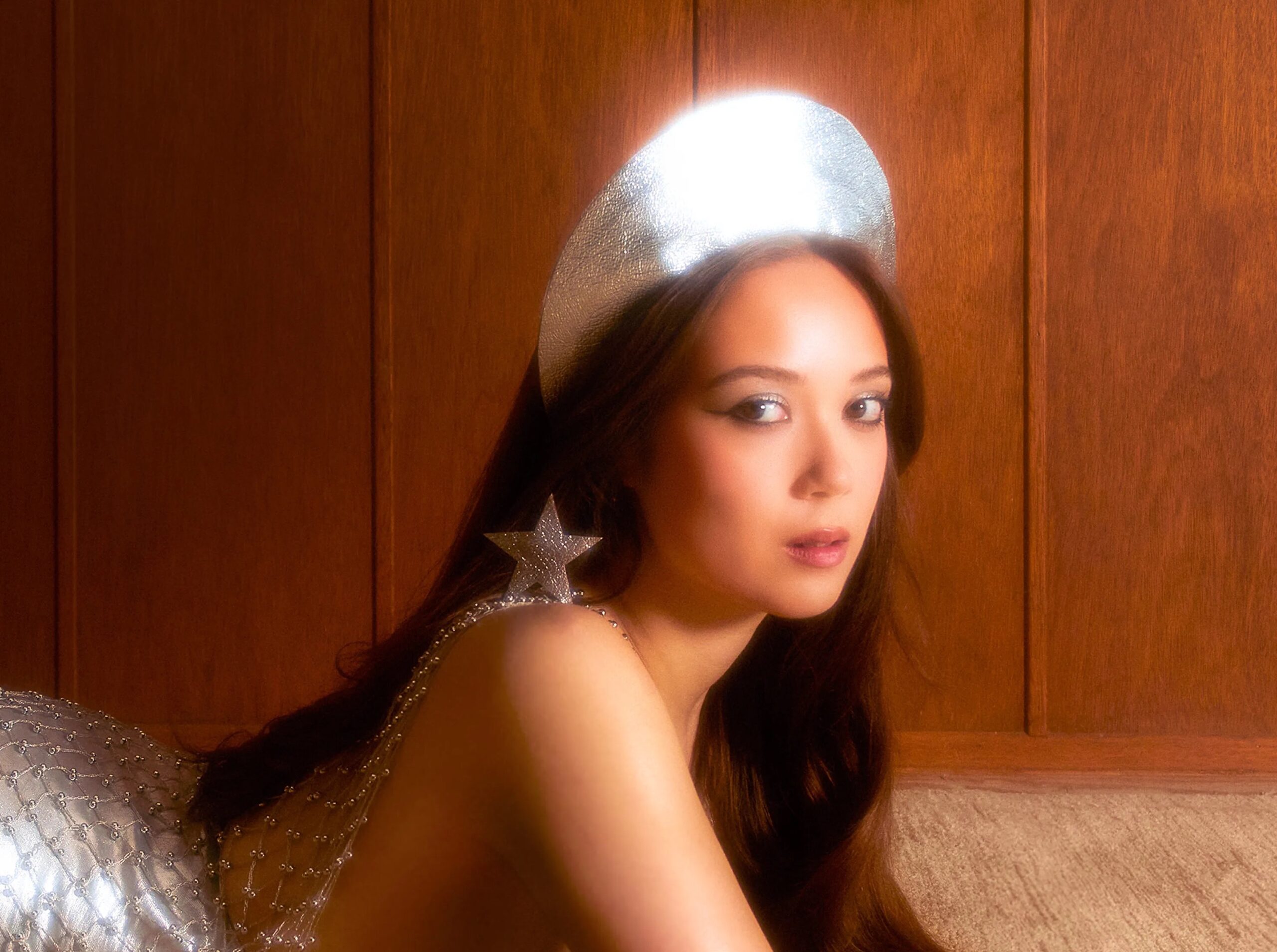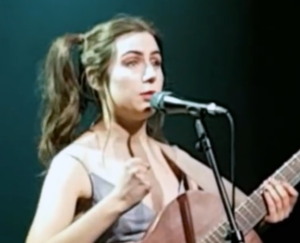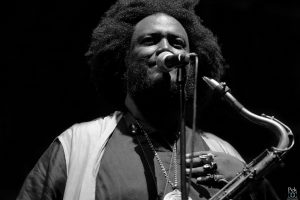The charts might suggest that jazz is a relic of a bygone era, reaching its peak with legends like Ella Fitzgerald and Chet Baker, before fading into obscurity (or irrelevance). But 24-year-old artist Laufey is determined to change that.
Soft, smooth, and silky—Bewitched (2023), the singer-songwriter’s sophomore studio album, now boasts the record for biggest jazz debut on Spotify. Blending bedroom pop and her classical music training, Laufey has ignited a passion for jazz in a new generation. By captivating an otherwise untapped market at the intersection of old and new musical styles, she’s carving out her own niche, enchanting all those willing to listen. On Bewitched, Laufey invites you to float up into her fantasy world, reminding us of the transportive magic of jazz. Not only is the album sonically lush, it follows a perfect fairytale arc, with Laufey making the long journey from cynical witch to lovesick princess.
Bewitched cycles through romanticism and heartbreak, key tenets of Laufey’s discography thus far. Upon an initial listen, it seems that there’s no true method to her madness; she’s being, appropriately, haunted by a past love in “Haunted,” and then, immediately after, recounting all the romanticized moments in her life in “Must Be Love.” However, when looking at the album as a whole, the pieces begin falling into place; it is quite literally a fairytale. It’s whimsical and magical and fantastical—the way all other of these mythical tales are supposed to be—but Laufey hits all the major narrative points, from cast-out cynic to starry-eyed love, making her a master storyteller. Uniquely, it isn’t just explicit lyricism that outlines this tale; instead, Laufey uses the order of the album and the production of her songs as a whole to create an entire narrative structure.
Bewitched has exposition, rising action, climax, falling action, and resolution; all of which develop the story. “Dreamer” is an introduction to our heroine and her background, transporting the audience straight to her “own little cloud / Up by the Milky Way,” where she claims to stay “forever and a day.” Immediately, the imagery evokes a storybook theme while simultaneously establishing Laufey as both the protagonist and the author of her own tale. As she declares that no “boy’s going to kill the dreamer in me,” her romantic frustration is on full display. The song paints the tale of a jaded individual—Laufey calls herself a “witch”—who is supposedly completely turned off by love, while secretly yearning for it. The repeated use of “boy(s)” as opposed to “men” is particularly telling of her partners’ childishness. She uses the same language later in “Promise,” recalling a boy who looked just like her past love. In characterizing her old flames this way, Laufey discredits their maturity, allowing her to detach from any need for their affection. With her resolute tone of voice, coupled with a jaunty, jazzy tune, Laufey proves to be liberated and leagues ahead of these lovers.
“Second Best” and “Haunted” provide more context on Laufey’s newfound romantic cynicism before she falls back to pursuing romance in the songs that follow. The transition from “Must Be Love” to “While You Were Sleeping” to “Lovesick” chronicles the growing intensity of Laufey’s feelings as she goes from realizing she’s falling in love, to tentatively accepting this understanding, to quite literally being lovesick. It’s an overwhelming revelation for her, and she sounds almost shocked as she asks “What have you done to me?”
Despite this seemingly positive turn, the climax quickly arrives with a dark twist as Laufey’s lover leaves her for an old flame in “California and Me.” No fairytale is without a major turning point, so of course her seemingly perfect happiness must be torn away. Her worst fears about new affairs are confirmed: “Should’ve figured that you’d go back to New York.” It’s a classic fairytale betrayal, emblematic of a predestined conflict. This ballad was performed with the renowned Philharmonia Orchestra, making the sadness embedded in the song all the more sweeping; over expansive strings and mournful woodwinds, punctuated by heady flutes, Laufey regrets that she “couldn’t make [her lover] stay.”
“Promise” continues where “California and Me” left off, as Laufey rationalizes her significant other’s departure, claiming it wasn’t supposed to be a forever goodbye but a “see you very soon.” By making the worst seem less extreme, Laufey attempts to save herself from heartbreak. To put “From The Start” right after, however, is somewhat baffling, breaking the cinematic immersion fostered thus far. It’s bouncy, flouncy, and fun, with bossa nova guitars and intricate piano fills, and it seems out of place between “Promise,” with its abundant melancholia, and “Misty,” a demure cover of Erroll Garner’s 1954 hit. There’s no smooth transition to bring us back to the falling action in that initial story structure, but Laufey’s forgiveness is implied. It could have been more effective to further develop the emotional pain Laufey is so good at expressing (Bewitched’s release is just in time for Sad Girl Autumn), but a one-off, upbeat song doesn’t completely take away from the overall storyline, even if it doesn’t fit as perfectly in this body of work.
Laufey creeps towards the conclusion of her tale in a muted tone—quietly, she swears she is finally at peace in “Serendipity.” In “Letter To My 13 Year Old Self” she reassures her younger self she will not only grow up to do great things, but she is also deserving of love, despite being ostracized. Her true ending, however, comes in “Bewitched,” which closes out her fantastical, almost cliché princess arc. An opening instrumental sequence reminiscent of a Disney movie—complete with winding piano chords signaling a magical transformation—leads to Laufey’s discovery, despite her previous denial, that she is in love. She is effectively spell-bound by her partner, bewitched really, having fallen under every single charm in the book. It’s a switch in the roles she set out so much earlier on in her story, considering she’s not the one casting spells anymore. All of a sudden, Laufey is no longer the isolated, weary witch she thought herself to be at the very beginning. However, she’s not shocked the way she was in “Lovesick,” only mildly bewildered that she is allowing herself to feel this way. Laufey resigns herself to the feeling, but it’s difficult to be upset that this is how she decides to settle down. She sings softer and in a tone that sounds almost like awe, so perhaps this is truly the peace she promises herself in previous songs.
Laufey has lived and learned, so who can blame her for wanting to love too? After building up this entire storybook narrative against an enchanting jazz background, the love she ends up with in Bewitched is the happy ending she deserves.
VOICE’S CHOICES: Dreamer, While You Were Sleeping, California and Me, Promise





